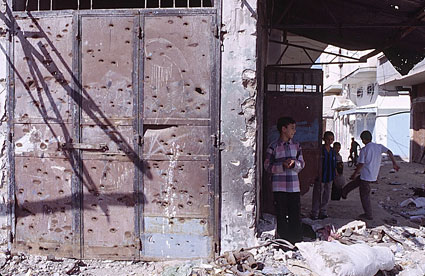
Photo: Darren Ell
|
 Photo: Darren Ell |
| Jamila 'Issa, Shati' camp, April 4:
|
|
One of the places I went to in search of speakers was Shati' camp (the camp nearest to Gaza city) where the Women's Empowerment Project had a branch. I had already visited the WEP's head office in Rimal (Gaza City), and had briefly met its director, Dr Shadia Sarraj who, like her brother Iyad, is a psychologist. It's a good place to visit, bursting with vitality and works of art. A few days after this meeting I went out to Shati' with several WEP employees, was shown around, and then introduced to Jamila 'Issa, who was taking a course in the Vocational Training section. I recorded with her in the WEP office, not in her home.
A plump, youngish, friendly woman, mother of two children in kindergarden, Jamila's story was quite typical of Palestinian displacement. She was born in Lebanon, of a Palestinian father and Lebanese mother; moved to Syria to marry a Palestinian from Rafah (Gaza). From Syria they moved to Libya. After Oslo, she had 'returned' to Gaza. Of course Gaza wasn't her home, it was her husband's home. Palestinians from other regions often find Gaza 'strange', even 'backward' but Jamila 'Issa didn't complain. People here are good, she said - she has made friends. Economic conditions are bad, that's why she's taking a dressmaking course, to supplement her husband's meagre salary. She'd be happy |
to go back to Libya - but it isn't possible - the Israelis control everything and they still haven't issued Jamila and her husband with ID cards. Without them they are stuck.
Jamila's calm, cheerful voice, with its familiar 'Lebanese' Palestinian accent, is reassuring. I reflect that, however constrained by poverty and permit problems, Palestinian women have the inner resources to make a good life for their children. They pack, and move, and set up again in a new place, among new people. I can imagine how quickly Jamila would exchange background stories with neighbours, how quickly she'd suss out the problems and possibilities of this new milieu. Though forced to live in a refugee camp in Gaza - hardly a 'desirable location' - Jamila will create a home here for her children and husband. Jamila 'Issa begins her story: |
[Amneh Zakkout] [Umm Sa'id Shmeis] Copyright©2005 |
|